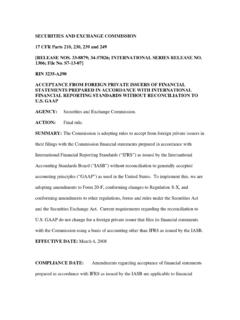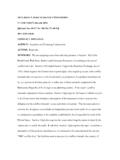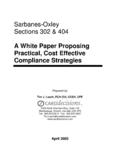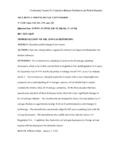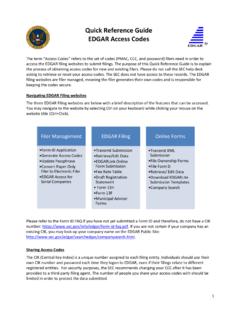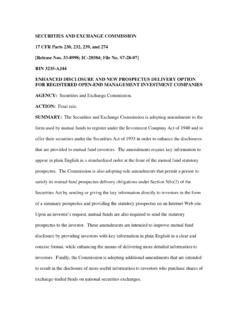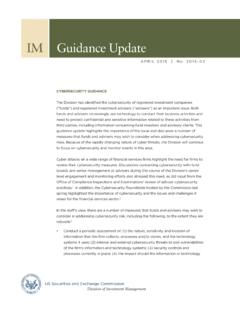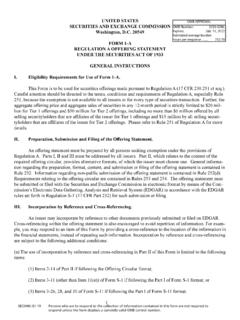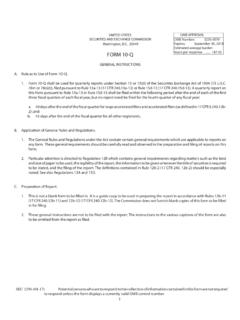Transcription of UNITED STATES OF AMERICA Before the SECURITIES AND ...
1 UNITED STATES OF AMERICA . Before the SECURITIES AND EXCHANGE COMMISSION. SECURITIES EXCHANGE ACT OF 1934. Release No. 86740 / August 22, 2019. ACCOUNTING AND AUDITING ENFORCEMENT. Release No. 4065 / August 22, 2019. ADMINISTRATIVE PROCEEDING. File No. 3-19373. In the Matter of ORDER INSTITUTING CEASE-AND- DESIST PROCEEDINGS PURSUANT TO. DEUTSCHE BANK AG SECTION 21C OF THE SECURITIES . EXCHANGE ACT OF 1934, MAKING. Respondent. FINDINGS, AND IMPOSING A CEASE- AND-DESIST ORDER. I. The SECURITIES and Exchange Commission ( Commission ) deems it appropriate that cease- and-desist proceedings be, and hereby are, instituted pursuant to Section 21C of the SECURITIES Exchange Act of 1934 ( Exchange Act ), against Deutsche Bank AG ( Deutsche Bank or Respondent ). II. In anticipation of the institution of these proceedings, Deutsche Bank has submitted an Offer of Settlement (the Offer ) which the Commission has determined to accept.
2 Solely for the purpose of these proceedings and any other proceedings brought by or on behalf of the Commission, or to which the Commission is a party, and without admitting or denying the findings herein, except as to the Commission's jurisdiction over it and the subject matter of these proceedings, which are admitted, Respondent consents to the entry of this Order Instituting Cease- and-Desist Proceedings Pursuant to Section 21C of the SECURITIES Exchange Act of 1934, Making Findings, and Imposing a Cease-and-Desist Order ( Order ), as set forth below. III. On the basis of this Order and Respondent's Offer, the Commission finds1 that: SUMMARY. 1. This matter concerns violations of the books and records and internal accounting controls provisions of the Foreign Corrupt Practices Act of 1977 (the FCPA ) by Deutsche Bank. Between at least 2006 and 2014, Deutsche Bank provided valuable employment to the relatives of foreign government officials in various parts of the world as a personal benefit to the officials in order to improperly influence them to assist the bank in obtaining or retaining business or other benefits.
3 2. Deutsche Bank recognized that hiring relatives of foreign government officials and other clients in exchange for business could violate anti-bribery laws, including the FCPA. In 2010, Deutsche Bank enacted a written hiring policy in the Asia-Pacific region ( APAC ) to detect and prevent its employees from offering temporary employment to candidates referred by current or potential clients to detect and prevent corrupt hiring practices. This hiring policy was not effectively enforced and did not apply to all categories of hires. Additionally, Deutsche Bank, although aware of corruption risks in its referral hiring practices, failed to implement global policies sufficiently to address this risk until 2015. 3. Deutsche Bank employees created false books and records that concealed corrupt hiring practices and failed to accurately document and record certain related expenses and Deutsche Bank failed to devise and maintain a system of internal accounting controls around its hiring practices sufficient to provide reasonable assurances that its employees did not bribe foreign government officials.
4 RESPONDENT. 4. Deutsche Bank AG ( Deutsche Bank ) is a multinational financial services corporation incorporated and domiciled in Germany. The company issues and maintains a class of publicly traded SECURITIES registered pursuant to Section 12(b) of the Exchange Act and is listed on the New York Stock Exchange (ticker: DB). Deutsche Bank files periodic reports, including Forms 20-F, with the Commission. Deutsche Bank operates in more than 70 countries worldwide and is the 1. The findings herein are made pursuant to Respondent's Offer of Settlement and are not binding on any other person or entity in this or any other proceeding. 2. direct or indirect holding company for Deutsche Bank's subsidiaries. Deutsche Bank employees in various parts of the world engaged in the conduct discussed FACTS. Deutsche Bank Policies Prohibited Employment in Exchange for Business 5. Since at least 2009, Deutsche Bank's Global Anti-Corruption Policy prohibited employees from providing anything of value to a government official to gain an improper business advantage.
5 Prior to 2009, various policies and procedures addressed anti-bribery and corruption issues at the bank. In 2009, Deutsche Bank specifically defined anything of value in the Global Anti-Corruption Policy to include job offers and recognized that providing employment at the request of a client, potential client, or government official could violate Deutsche Bank's anti- bribery policies. A regional compliance memo in 2009 explained, hiring interns with links to State Owned Enterprises and Government Officials, hiring interns who did not appear to meet [Deutsche Bank's] basic criteria .. with respect to education, qualifications and credentials, and hiring interns within a short period of a mandated deal being awarded or completed posed corruption risks: Because of this significant value and the benefits received there are regulatory and reputational risks that the offering of these internships to our clients (current or prospective).
6 Without going through a fair, formal and documented selection process could be perceived as Deutsche Bank trying to gain an improper advantage.. 6. Despite these prohibitions, since at least 2006, Deutsche Bank's APAC operations engaged in a pattern and practice of providing employment to relatives at the request of SOE executives from whom Deutsche Bank sought business. In APAC many of the bank's clients and prospective clients were State-Owned Entities ( SOEs ) whose employees are deemed foreign officials . under both the FCPA and Deutsche Bank policies. Client referral hires were primarily known at Deutsche Bank as Referral Hires and/or Relationship Hires.. 7. From the outset, the primary goal of Referral Hiring was to generate business for Deutsche Bank by extending personal favors to clients, including government officials, through hiring their relatives. For example, during the time Deutsche Bank was working to obtain an IPO from a Chinese client, the client's Chairman asked Deutsche Bank to hire his son.
7 The banker working to obtain the IPO told Deutsche Bank management that if Deutsche Bank hired the Chairman's son, he believed they would be awarded the business. In other instances, when bankers submitted a client referral hire request, management in APAC asked what role the parent performed at the SOE. to determine if the parent could steer business to the bank and asked the banker to quantify the fees Deutsche Bank could expect to earn from the referring client. 2. Deutsche Bank employees referenced in this Order may have worked for one or more Deutsche Bank legal entities during the relevant time. Deutsche Bank acknowledges it is responsible for ensuring accurate books and records, and sufficient internal accounting controls, within its consolidating businesses. 3. 8. Referral Hires bypassed Deutsche Bank's highly competitive and merit-based hiring process where successful applicants were required, among other things, to have a high grade point average, to pass competency based numerical and verbal skills tests, and advance through multiple rounds of interviews.
8 In contrast, Referral Hires did not compete against other candidates based on merit or academic qualification and, in many instances, were less qualified than those employees hired through Deutsche Bank's formal hiring process. Referral Hires had no formal application process, no defined qualifications such as a minimum grade point average or educational requirement, no competency test requirements, and no specific interview requirements. To help unqualified Referral Hires appear qualified, some APAC-based Deutsche Bank employees even drafted portions of their resumes, provided them with interview questions and answers in advance, and coached them on how to appropriately respond to questions. Some were hired without being interviewed at all. Deutsche Bank provided this preferential treatment to candidates referred by clients and prospective clients, including foreign government officials.
9 9. Similar misconduct took place from 2009 to 2012 in Russia, where Deutsche Bank employees hired relatives at the request of foreign officials in Russia to obtain or retain business or other benefits. As was the case in APAC, Russian Referral Hires were sometimes unqualified. In some instances, if requested by the candidate or parent, Deutsche Bank's London-based global management authorized unqualified Russian Referral Hires to work in London. One Russian Referral Hire performed so poorly in London that he was deemed a liability to the reputation of the program, if not the firm by a London-based human resource employee. Deutsche Bank Created a Hiring Policy in 2010 for the APAC Region 10. In 2010, Deutsche Bank implemented a hiring policy specifically for the APAC region ( APAC Hiring Policy ) that prohibited Deutsche Bank's employees in APAC from offering off- cycle internships, , internships outside of Deutsche Bank's formal internship programs, to any candidate referred by a client, prospective client or government official from whom Deutsche Bank sought or had pending business, subject to an approval process established by the policy.
10 The APAC Hiring Policy specifically defined employees of SOEs and government ministries as foreign officials. Importantly, the APAC Hiring Policy also prohibited employees from hiring Referral Hires as a temporary employee or in other roles to evade the policy. 11. As part of the APAC Hiring Policy, Deutsche Bank created a questionnaire which required employees who sought approval for a Referral Hire to disclose the source of the referral, identify whether the referral source was a current or prospective client, and disclose whether the Referral Hire was referred by or related to a government official. The questionnaire was then supposed to be submitted to the compliance and human resources departments for review and approval. However, Deutsche Bank did not ensure that the APAC Hiring Policy was effectively implemented. 12. Significantly, some senior Deutsche Bank employees in APAC, including Deutsche Bank's Chairman of Corporate Finance, Asia ( Chairman of APAC Corporate Finance ), ignored or deliberately bypassed the APAC Hiring Policy by directing Deutsche Bank's China-based joint venture ( JV ) to hire a prohibited candidate to obtain business and evade the policy.
